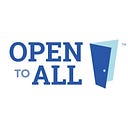Employee Resource Groups: Best Practices for Development and Engagement
When starting at a new company, finding community is a critical aspect of the onboarding process. For many employees from historically marginalized communities, finding colleagues with shared interests, experiences, and identities can be challenging. Employee resource groups (ERGs) are an important aspect of creating a culture of belonging.
Employee resource groups provide a safe space for workers. ERGs are known to enhance working conditions, foster trust, identify new leaders, and effect lasting change. ERG contributions are woven into a company’s fabric; they play a crucial role in making better products and decisions.
Open to All recently hosted a panel discussion presenting best practices for developing employee resource groups. We were joined by representatives from Airbnb, Michaels, Tapestry, and Yelp, who shared ways their companies have found success while forming and supporting employee resource groups.
Emphasizing Intersectionality
The truth is that we are all multifaceted and multidimensional, and our identities similarly reflect that. As a result, it’s important that employees recognize that they can join multiple ERGs that reflect the communities in which they are members.
During our briefing, Yelp mentioned that one way of doing so is through collaborative, intersectional initiatives and activations. In the past, WAY (Women at Yelp), YelpMoms, and YelpParents united to organize a conversation on postpartum depression and anxiety. Other previous intersectional events have included a discussion on colorism in the Latinx community, a workshop on scarcity mentality’s impact on historically excluded communities, and a cooking demonstration with Nelson Herman, an Oakland-area Latino chef. By hosting events that serve multiple communities, employees’ identities are recognized in a holistic and all-encompassing way, as opposed to making people feel like they must choose or cover a certain part of their identities.
Encouraging Cross-Company Collaboration
Employee resource groups are led by passionate individuals aiming to do better for their communities and company. ERGs are comprised of professionals from a variety of departments and fields, including marketing, project management, finance, executive assistance, and countless others. In larger companies, these colleagues might seldom engage with one another. During our panel, Tapestry shared how their ERGs have provided a unique opportunity for employees to form connections and establish commonalities with co-workers they may never have interacted with otherwise. This not only results in effective and innovative ERGs, but having access to a cross-departmental network also aids professionals in their day-to-day work responsibilities.
Measuring Success
Much like any initiative, collecting and analyzing data is a critical component of expanding ERG programming. One simple way to do so is to regularly monitor the membership of each employee resource group. Michaels recently piloted an internal survey to assess efficacy, reach, and opportunities for growth. The survey questioned participants on rates of communication and ERG focal points, as well as how they would like to get more involved with the group. This feedback can then be used to form goals, plan events, and grow membership.
Expanding Outreach
A one-size-fits-all approach to employee resource groups is simply insufficient. Certain efforts may work in corporate offices, while the same efforts may be incompatible with stores and fulfillment centers. Every employee resource group is at a different level of maturity, and every company is at a different stage in their ERG development. No matter where they are on their journey, there’s always more to be done to broaden outreach and engage more employees.
Yelp recently launched “location-based communities,” which allow remote employees to identify other Yelpers in their area. Yelp plans to cross-identify ERG membership and location data in the future to offer ERG-related activities in cities across the world. At Airbnb, their ERG positions are entirely voluntary. The company is presently exploring implementing a compensation structure that rewards leaders’ contributions.
Allowing your ERGs to define their own missions is the key to success. Our panelists advised against establishing any strict parameters or expectations because cadence, momentum, and priorities tend to fluctuate. When an employee chooses to put forth their commitments and amplify the respective causes of their ERGs, they gain a valuable and validating experience while fostering a culture of belonging within the entire company.
